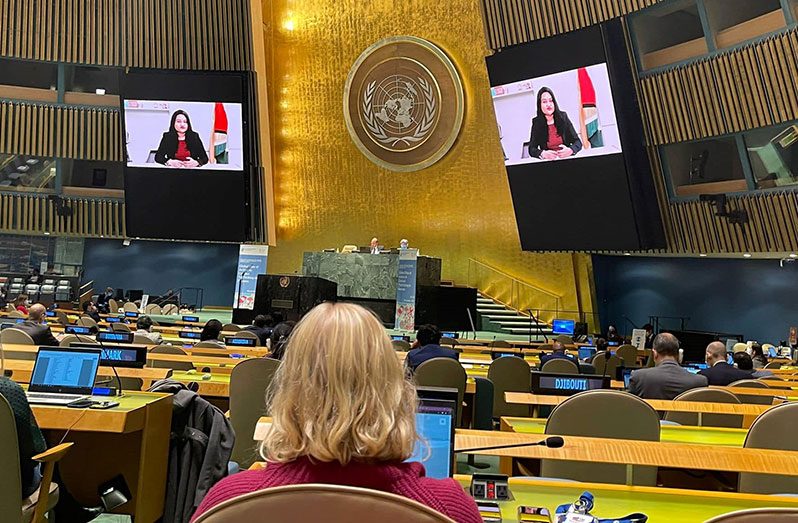IN keeping with its commitment to combat human trafficking in Guyana, government is finalising the 2021-2025 National Action Plan for the Prevention and Response to Trafficking in Persons.
This was disclosed by Minister of Human Services and Social Security, Dr. Vindhya Persaud, during a virtual address to the United Nations General Assembly High-Level Meeting for the appraisal of the Global Plan of Action to combat human trafficking, held on Monday.
The action plan is being developed by the Human Services Ministry and the Ministry of Home Affairs.
Minister Persaud, informed those gathered in the General Assembly Hall of the United Nations Headquarters in New York that as part of the plan, the revised Combating Trafficking in Persons Act will be presented to Guyana’s National Assembly before year-end.
It was reported that 78 per cent of human trafficking perpetrators in 2020 were men, predominantly Guyanese; 14 per cent of traffickers were from Venezuela, while less than three per cent were Dominican and Haitian.
Minister Persaud noted that the Government of Guyana has a zero-tolerance policy to TIP and is committed to the prevention of human trafficking and protection of victims within its available resources, as well as the prosecution of traffickers.
According to the U.S. Department of State 2021 Trafficking in Persons Report, Guyana has managed to maintain its Tier One ranking for its response to TIP locally. The tier ranking means that the Government of Guyana has fully met the minimum standards for the elimination of trafficking. Guyana is among just four South American countries to have achieved this status.
The U.S Department of State 2021 TIP Report states, “Despite the documented impact of the pandemic on the government’s anti-trafficking capacity, the government continued to demonstrate serious and sustained efforts during the reporting period; therefore, Guyana remained on Tier One. These efforts included increasing investigations, identifying and assisting more victims, creating the first anti-trafficking hotline in Spanish, opening an additional shelter, and creating standard operating procedures for victim identification.”
Minister Persaud, in reiterating government’s commitment to tackling this social ill stated, “Guyana has improved its capacity to collect information and report on suspected cases of trafficking, conduct undercover operations, provide support to victims to rebuild their lives and/or facilitate their repatriation when requested. Ongoing public awareness programmes are conducted in foreign languages and some Indigenous languages.”
She noted that Guyana recognises that TIP transcends borders and requires a coordinated global effort among member states through bilateral, regional, and international mechanisms in partnerships with the United Nations system, and other relevant stakeholders.
Minister Persaud further stated that the national action plan includes a strong training component that aims to equip frontline workers, police and community policing groups, customs officers, transport operators, and members of civil society with the skills to identify victims of trafficking.
Guyana has improved its capacity to collect information and report on suspected cases of trafficking, conduct undercover operations, provide support to victims to rebuild their lives, and/or facilitate their repatriation when requested. Ongoing public awareness programmes are conducted in foreign languages and some Indigenous languages.
Over the years, Guyana has incrementally increased its budgeted allocations to fight trafficking in persons.
Recent initiatives include offering a bilingual anti-trafficking 24-hour hotline to assist Spanish-speaking victims, and the development of standard operating procedures for victim identification. There has also been progress in dismantling some criminal networks in Guyana involved in trafficking.
Government shelters offer specialised care for victims, including training, translation, legal and medical services, and psychological therapy. The government also provides financial support to NGO-managed shelters while direct financial and other assistance are provided to victims who opt not to stay in a shelter.



.jpg)









